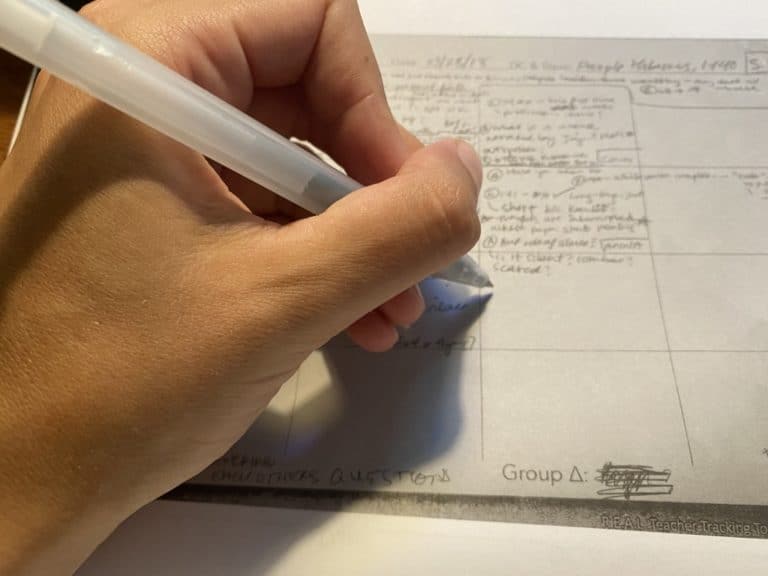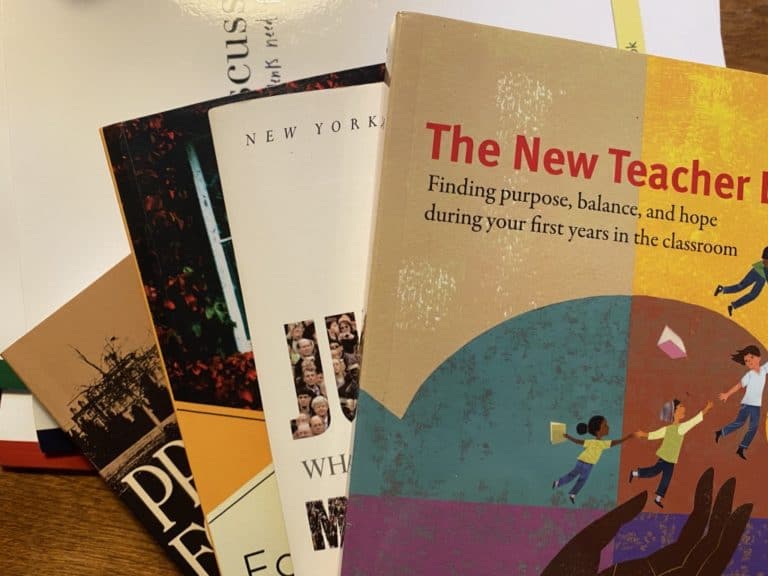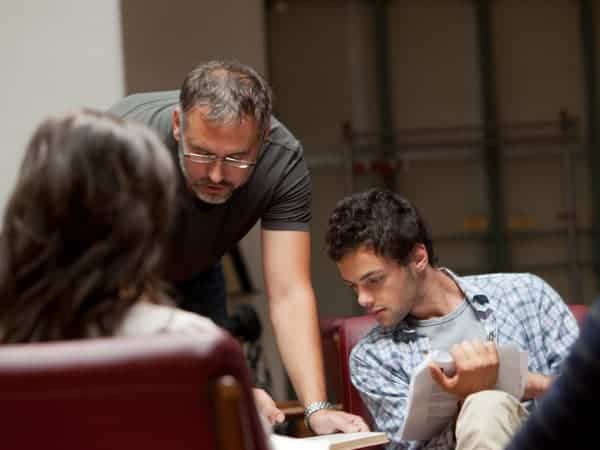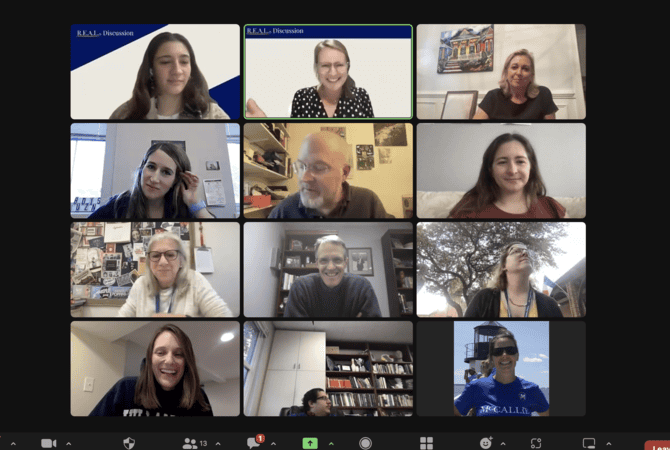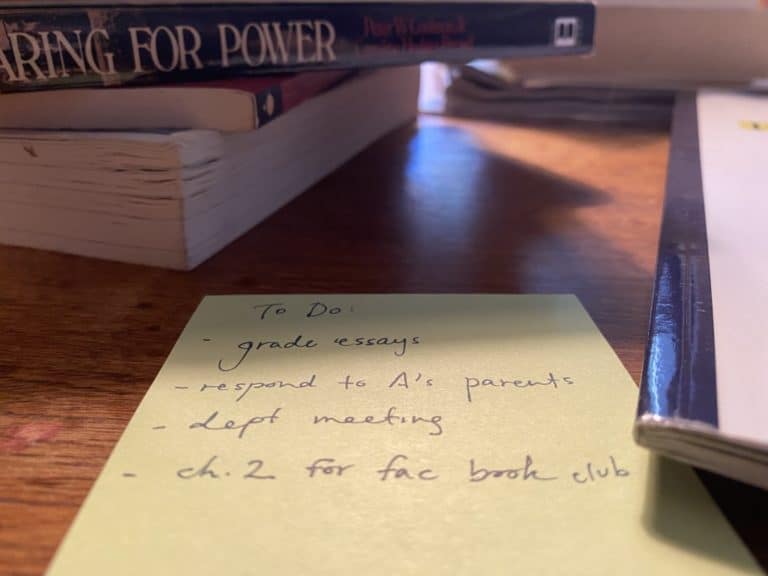REAL Teacher Feature: Erika Drezner
Thank you to Erika Drezner for sharing her REAL life with us! Erika is the Upper School English department chair at the Berkeley Carroll School in New York. Here are her thoughts on discussion, R.E.A.L.®, and learning.
Hometown: Ithaca, New York
Current City, School, Teaching Assignments:
English teacher and Upper School English Department Chair at the Berkeley Carroll School.
Describe yourself as a student in three words:
Inquisitive, talkative, teacher-adoring.
Who was your favorite teacher and why?
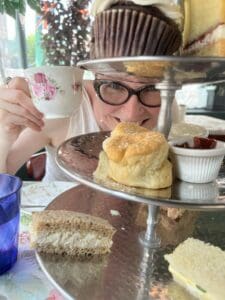
My 10th and 11th grade history teacher, Maryterese Pasquale-Bowen (“Mrs. PB”), was so smart and intense and asked such excellent questions, plus she advised a club called The Fabulous Feast Society where we organized and celebrated four historical period “feasts” per year: Regency balls, Welsh eisteddfods, Han Dynasty banquets, and Sienese Palio races. We researched food, costumes, dances, and entertainment and had a wonderfully nerdy time.
When it comes to class discussion, what is your “why”? What feels compelling and important about teaching these skills?
Here’s what’s on my classroom wall: “Good conversation helps us to live and play together, to build the inclusive, whimsical, and connected society we want to live in. Individually, we practice listening, asking, speaking, and attending to evidence so that collectively—taking a leap of faith and imagination together—we can create our conversation, our classroom, our world.”
Take us back to the first R.E.A.L.® Discussion you led – what were you worried about going into it? What surprised you about it?
I first tried R.E.A.L.® with 10th graders, some of whom were already very fluent discussion participants, and I worried that they would think it was hokey and artificial. But the other half of the class was routinely silent. And so I remember my amazement and joy during our first R.E.A.L® discussion, as I walked around listening and every student was talking. Every student. And all quoting from the text. And all connecting their ideas to things their classmates had said. And pausing to write things down. All while I said nothing. I was hooked.
How do you orient your students to R.E.A.L.®? What advice would you give to a teacher on the cusp of their first discussion?
I love the official R.E.A.L.® kickoff exercises, such as the terrible-discussion-skits and “Never Have I Ever.” But because belonging and authenticity are the heart of R.E.A.L.® for me, I take extra time to help students connect before we get rolling. I set the tone with a series of protocoled listening and sharing exercises, and I poll students privately about whom they can work with and create “home groups” of 3-4 where students feel safe. We practice R.E.A.L.® skills first in these groups, and then for each R.E.A.L.® discussion I recombine the home groups into different clusters and the results are amazing — every student always has two buddies, and from there, eventually, they connect with everyone else.
How do you go about planning for a R.E.A.L.® discussion? What have you figured out about the types of texts, DQs, or structures that work well for your students?
Besides belonging, my secondary R.E.A.L.® “why” is that discussion helps us to get ideas for our writing, so I associate each R.E.A.L.® discussion with an upcoming assessment. Before the discussion, I assign the assessment and explain how I think the discussion will help to activate writing ideas, and so, ideally, students understand the short-term intellectual purpose of each discussion and are on the lookout for useful discoveries as they take I.R.T. notes.
When it comes to discussion, what are your top 3 learning goals for your students?
- Everybody’s voice and ideas matter.
- When we discuss, we can create a “third thing” that’s better than anything one of us could have come up with alone.
- Discussion, practiced well, builds community.
Can you think of a moment you’ve experienced this year or last where a student had a breakthrough during a discussion? What did it look like? How did that feel as a teacher? Did you see it have an impact on the other students?
Last spring I presented students with a poem that I had typed up as a block of text, without line breaks. For DQ prep they all added their own line breaks and their discussion task was to compare and evaluate their choices. One of the groups decided to have someone read the poem aloud while everyone else yelled out “line break!” whenever they had added one. It was raucous, joyful, hilarious, and built from there into a great conversation. They were so proud of themselves, because they had broken through the mechanical stage of R.E.A.L® and were truly running their own show. The other teams were intrigued, a little jealous, and suddenly aware that they could stretch R.E.A.L.®, too. At first I was worried they weren’t doing it “right,” but then I didn’t care because it felt so — real.
What is your go-to reward for grading a big pile of papers?
Birdwatching! A long walk in Prospect Park or Green-Wood Cemetery with binoculars in hand.
What discussion challenges have you encountered? How do you approach them?
I don’t grade formative assessments, so my main challenges have involved getting the students to do the work (DQ prep, tallying) without the extrinsic motivation of a grade. Two strategies I’ve had success with are building in 25 minutes of DQ prep in class for the first couple of discussions, so they can feel how well it goes when they’re prepared, and letting them practice tallying someone else during a fishbowl discussion before they tally themselves. But my favorite hack is to bribe them—one M&M for each tally mark—until they learn the benefits of gathering their own data.
What inspires you? Do you have a favorite quote right now?
Always this one: “I believe that education, therefore, is a process of living, and not preparation for future living” (John Dewey, “My Pedagogic Creed.”) The world feels very uncertain right now, and this quotation calls me into the present moment with my students and reminds me that no matter what happens, the community we’re creating together matters now.
What’s next for you and your class? Where do you hope to take R.E.A.L.® in 2023-2024?
I’m super excited to be piloting, starting in January, a semester course for seniors entirely about good conversation as a fundamental tool of collaboration, problem solving, and citizenship. My students will help me to build it. R.E.A.L® will be part of it, but we’ll also be trying lots of other protocols — I’m seeking the right blend of routine and experimentation. I know that one of their first tasks will be to choose through consensus a few books, art exhibits, and current controversies that they’d like to read, view, explore, and discuss together. Wish me luck!


